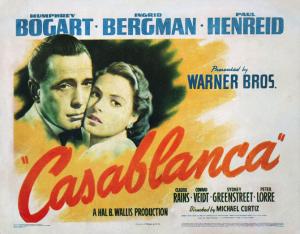Casablanca Reminds Us: You Must Remember This
Pub Notes

Casablanca ran on TCM last week, and of course I had to watch it again. It’s one of those touchstone films that help tell us who we are. You know the story: Refugees are crowded into Rick’s Café Americain in Morocco at the beginning of World War II, trying to make it to America to escape Nazi oppression in Europe. Meanwhile, America sleeps. We don’t want to get involved in foreign wars. “I stick my neck out for nobody,” Rick says for us.
Even asleep, though, America is the beacon for these oppressed people, whose hero is the freedom fighter, Victor Lazlo, also trying to escape to America with his wife Ilsa, who had a romance with Rick in Paris before the Germans came, back at Rick’s Bel Aurore café, where Sam played “As Time Goes By” on the piano, back when Ilsa thought her husband was dead.
Well, he wasn’t, so she had to ditch Rick, but she couldn’t tell him why, because it would jeopardize Lazlo, and Rick has been bitter ever since—mean-drunk bitter and sticking his neck out for no man. Then, Lazlo and Ilsa come waltzing into his café desperately hoping, like everybody else, to score some exit visas so that Lazlo can continue his resistance from the safety of America before the Germans grab him again and finish him off.
The Germans are in Café Americain, too, led by that quintessential Nazi, Maj. Strasser, the arrogant, snarling, menacing personification of all America should be fighting against, if only she would wake up.
Casablanca was a thrown-together B-movie shot on Hollywood’s back lots, with the script hastily written barely in time for the next day’s filming, but with a first-rate cast and exquisite timing. Just before it was released, Roosevelt, Churchill and Stalin met in the real Casablanca to coordinate wartime plans, America by then having been awakened by Japanese bombs.
Unless you’re one of those who want to go through the whole Nazi thing again, you can’t help but thrill when Lazlo stands up to the Germans and then Rick does, too, and even the cynical Vichy-leaning Capt. Renault. Rick and Ilsa reconcile, and he sends her off to help her husband because he knows that if she doesn’t, she’ll regret it. “Maybe not today, maybe not tomorrow, but soon, and for the rest of your life.”
Their love story is charming and heartwarming, but the real story is America and what our country represents in that world. In the movie, we represent freedom from the Nazi oppression personified by Maj. Strasser, and we finally wake up and, with our allies, defeat the Germans and make the world safe for democracy again. In truth, of course, when Casablanca came out, we were not welcoming the Jewish refugees trying to escape the Nazi concentration camps and the mass murder of the gas chambers and ovens that “cleansed” Germany of its Jewish problem.
Today, as we rewatch this iconic film, our borders are closed to those fleeing Isis, one of the worst of the modern-day murderous oppressors. Our country is withdrawing from international agreements to limit the spread of nuclear arms, from international economic cooperation, from international efforts to halt the global warming that is devastating our planet more thoroughly than the Nazis ever could. With the world in flames, America is going back to sleep, is building walls to keep out the world and is sliding back toward the America First ideology that would have allowed the Nazis to complete their conquest of Europe.
I guess the “good people” who rallied in Charlottesville and continue to idealize a fascist America view Casablanca, if they watch it at all, as an example of American weakness in refusing to join forces with the master race. They no doubt thrill to other movies such as Birth of a Nation that idealize freedom fighters like the Klan that liberate our own country to pursue our own interests without meddling from foreigners.
It’s still the same old story, a fight for love and glory, and the other side has the money and the power and is winning the fight—as time goes by.
Keywords
More by Pete McCommons
-
Voting Absentee: Necessary But Not Easy
Pub Notes
-

Be Ready When National TV Comes Calling
Pub Notes
-










comments